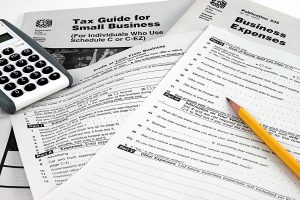 Small business tax preparation is no small tax; you’ve probably already discovered this if you’re growing a business. Even someone who has done their individual taxes for years can feel like business tax preparation is a completely separate arena.
Small business tax preparation is no small tax; you’ve probably already discovered this if you’re growing a business. Even someone who has done their individual taxes for years can feel like business tax preparation is a completely separate arena.
But you still need to get it done. Fortunately, we’re here to help. Take a look at what you need to know about managing taxes for your small business.
What to Know When Filing Business Taxes
If this is your first year filing business taxes, the first step is selecting the right IRS filing form. This will depend on how you registered your business. Here’s a quick guide for selecting the right tax form:
- Sole Proprietorship: You may be able to add income and expenses for your business to your personal return using the Schedule C attachment.
- Sole Owner of an LLC: Again, the Schedule C attachment may work.
- Corporation: You’ll probably need to use Form 1120.
- S-Corp: You’ll probably need to use Form 1120S.
- LLC That’s Treated as a Corporation: You’ll probably need to use Form 1120.
- Partnership: You’ll probably need to use Form 1065 with Schedule K-1.
If you’re still unsure about which form to use, look into utilizing small business tax services to get a clearer picture.
How Do I File Business Taxes?
Start by gathering all of the financial records and receipts tied to your business for the year. This includes things like travel expenses, employee compensation, non-employee (contractor) compensation, and home-offices expenses.
If you’re filing a Schedule C, this two-page form allows you to subtract all business expenses for the year from your earnings. This will give you your “net profit” or “net loss” for the year. You’ll move the number you get over to your personal income tax form. If you’re filing Form 1120, you’ll still subtract your expenses from your earnings like you would with a Schedule C. However, you’ll be supplying more details about your business before filing the form separately from your personal taxes.
When Are Business Taxes Due?
Business tax preparation requires most people to re-learn tax deadlines because business deadlines aren’t the same as personal tax deadlines. First, you’ll need to keep up with estimated quarterly taxes if you expect to owe at least $1,000 in taxes for the current tax year after subtracting your withholding and refundable credits when filing an individual tax return.
Corporations are generally required to make estimated tax payments if they expect to owe $500 or more when filing returns. Due four times per year, quarterly taxes need to be paid by April 15 (Tax Day), June 15, September 15, and January 15, based on a standard tax year’s calendar.
If you file using Schedule C, your business taxes will usually be due on April 15 just like your personal taxes, because the attachment is considered part of your IRS Form 1040. However, people who file using Form 1120 are required to file their tax returns by day 15 of the fourth month after the end of the tax year.
In most cases, that happens to fall on April 15. If you’re using Form 1120S or Form 1065, it’s a bit different. These must be filed on day 15 of the third month after the close of the tax year. In most cases, this falls on March 15. The tax calendar is actually pretty crowded if you own a business that employs other people because you also have to meet the quarterly deadlines for paying FICA (Federal Insurance Contributions Act) and FUTA (Federal Unemployment Tax Act) taxes. In addition, it’s necessary to stay on top of reporting FICA and FUTA withholdings, submitting W-2s, and submitting 1099s.
How Much Can a Small Business Make Before Paying Taxes?
Generally, you’re required to file a return if you earn at least $400 from a business in a year. Being required to file doesn’t necessarily mean you’ll owe taxes, though. The specific threshold for your business will depend on how your business is registered, which IRS form you use to file, and how much you earn in other income.
What Documents and Information Will a CPA Need for My Small Business Taxes?
If you intend to hire business tax preparation services, make sure you gather all your documents. This includes cash-flow statements, balance sheets, and income statements. You should also gather all documents related to asset activity, vehicle usage, office expenses, legal expenses, property taxes, paid quarterly taxes, insurance expenses, and payroll. Business expenses often help reduce your tax liability through deductions.
Get Help Preparing and Filing Your Small Business Taxes
Tax Group Center has been offering small business tax preparation services for three decades. In addition to helping with tax preparation, we offer small business tax services related to tax planning, tax debt relief, and IRS negotiations. Let us help you get your taxes handled properly this year! Contact us today for an appointment.

